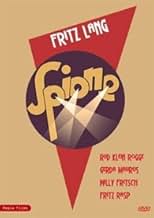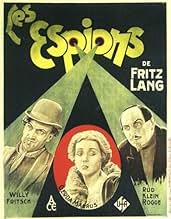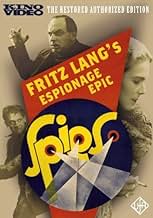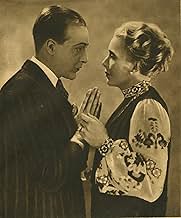IMDb RATING
7.5/10
4.2K
YOUR RATING
The mastermind behind a ubiquitous spy operation learns of a dangerous romance between a Russian lady in his employ and a dashing agent from the government's secret service.The mastermind behind a ubiquitous spy operation learns of a dangerous romance between a Russian lady in his employ and a dashing agent from the government's secret service.The mastermind behind a ubiquitous spy operation learns of a dangerous romance between a Russian lady in his employ and a dashing agent from the government's secret service.
- Awards
- 1 nomination total
Grete Berger
- Unconfirmed Role
- (uncredited)
Julius Falkenstein
- Hotel Manager
- (uncredited)
Heinrich Gotho
- Burton Jason's Other Assistant
- (uncredited)
Heinrich Gretler
- Spy in the Post Office scene
- (uncredited)
Gustl Gstettenbaur
- Boy Who Helps No. 326
- (uncredited)
Georg John
- Locomotive Engineer
- (uncredited)
Theodor Loos
- Handelsminister
- (uncredited)
Klaus Pohl
- Burton Jason's Assistant
- (uncredited)
Featured reviews
Fritz Lang, undeniably one of the greatest and most influential film-makers in all of cinema, is one of my favorites and, from his early work which remains, perhaps, his most important I only had a few of his surviving films still to catch up with. SPIONE was one of them and, now that I've watched it, I can confirm its stature as one of his very best, if relatively little-known.
The film is basically a follow-up to Lang's seminal two-part DR. MABUSE, THE GAMBLER (1922) and, indeed, it's Rudolph Klein-Rogge himself who originated the role of Mabuse who plays the evil crimelord here (called Haghi and who is made-up to resemble Lenin!). SPIONE follows much the same pattern of intrigue, thrills and action; however, the film's narrative structure is not straightforward but rather elliptical and, even though ostensibly dealing with the conflict which may arise were a treaty to fall into the wrong hands, several major plot points are left deliberately obscure (in fact, we never get to know what the treaty actually contains a precursor to Hitchcock's beloved "McGuffin", perhaps or what Haghi's intentions are, once he gets his hands on it!). In this respect, the social conscience so pronounced in the Mabuse diptych coming, as it did, on the heels of Germany's defeat in WWI is largely jettisoned here in favor of romance (between a female spy desired, and being blackmailed, by Haghi and the Secret Service agent who is the mastermind's nemesis), eroticism (the ensnaring of a central political figure by a vamp in Haghi's service) and technical dexterity (ensuring that SPIONE's considerable 2½-hour running-time goes by rapidly and without any longueurs, in my estimation at least, as opposed to the sluggish and rather static Mabuse). It is not inconceivable, therefore, to discern in Lang's fanciful melodrama the germ for all the spy thrillers which followed from Hitchcock to the James Bond extravaganzas and beyond.
As befits a master story-teller like Lang, particularly during this most creative phase of his career, SPIONE is virtually a catalogue of memorable scenes (interestingly enough, the supplementary photo gallery includes shots from sequences that are missing in the main feature!) chief among them a ghostly visitation, a ritual suicide, a train-wreck, a police raid on a bank and a stage performance by a clown; however as opposed to the DVD back-cover, which blatantly spells out its most clever twist in emulation of the film itself, I've refrained from giving too much away about them here
The film is basically a follow-up to Lang's seminal two-part DR. MABUSE, THE GAMBLER (1922) and, indeed, it's Rudolph Klein-Rogge himself who originated the role of Mabuse who plays the evil crimelord here (called Haghi and who is made-up to resemble Lenin!). SPIONE follows much the same pattern of intrigue, thrills and action; however, the film's narrative structure is not straightforward but rather elliptical and, even though ostensibly dealing with the conflict which may arise were a treaty to fall into the wrong hands, several major plot points are left deliberately obscure (in fact, we never get to know what the treaty actually contains a precursor to Hitchcock's beloved "McGuffin", perhaps or what Haghi's intentions are, once he gets his hands on it!). In this respect, the social conscience so pronounced in the Mabuse diptych coming, as it did, on the heels of Germany's defeat in WWI is largely jettisoned here in favor of romance (between a female spy desired, and being blackmailed, by Haghi and the Secret Service agent who is the mastermind's nemesis), eroticism (the ensnaring of a central political figure by a vamp in Haghi's service) and technical dexterity (ensuring that SPIONE's considerable 2½-hour running-time goes by rapidly and without any longueurs, in my estimation at least, as opposed to the sluggish and rather static Mabuse). It is not inconceivable, therefore, to discern in Lang's fanciful melodrama the germ for all the spy thrillers which followed from Hitchcock to the James Bond extravaganzas and beyond.
As befits a master story-teller like Lang, particularly during this most creative phase of his career, SPIONE is virtually a catalogue of memorable scenes (interestingly enough, the supplementary photo gallery includes shots from sequences that are missing in the main feature!) chief among them a ghostly visitation, a ritual suicide, a train-wreck, a police raid on a bank and a stage performance by a clown; however as opposed to the DVD back-cover, which blatantly spells out its most clever twist in emulation of the film itself, I've refrained from giving too much away about them here
The powerful criminal and leader of a spy ring Haghi (Rudolf Klein- Rogge) uses his spies that are infiltrated everywhere including in the secret service in attempts to steal documents from the French Embassy in Shanghai and from the Minister of Trade that is murdered. The press questions and mocks the officials in charge of security of state and the efficient Agent No. 326 a.k.a. the vagrant Hans Pockzerwinski (Willy Fritsch) is summoned by the Secret Service Chief (Craighall Sherry) to investigate the wave of crimes. Agent 326 immediately identifies that his chief's assistant Vincent is a spy that is providing inside information to the evil mastermind that no one knows how looks like. Meanwhile, Haghi saves the scoundrel Hans Morrier (Louis Ralph) from the gallows to serve him. Then Haghi, who is also the general director of the Haghi Bank, blackmails Mrs. Leslane (Hertha von Walther), who is the wife of the powerful Roger Lesland and habitué of an opium den, to get information of the Japanese Secret Treaty. When Haghi assigns his master spy Sonya Baranilkowa (Gerda Maurus) to get closer to the elegant Agent No. 326, they unexpectedly fall in love for each other affecting Haghi's evil scheme. Meanwhile his spy Kitty (Lien Deyers) lures and seduces the reserved and efficient Japanese agent Akira Matsumoto (Lupu Pick) to steal his documents about the recently signed Treaty that may bring war to the world.
"Spies" is a fantastic epic of espionage, romance, seduction and betrayal by Fritz Lang and I dare to say that James Bond stories might have been inspired in this film. I saw "Spies" yesterday in a restored authorized edition of the DVD released by Kino Video, and in the Extras there is the amazing story of the restoration of this film. The 35 mm archives in nitrate throughout the world were very damaged and incomplete, but this complex version was assembled from several copies using the guidance of the copy from Prague that was the most complete and also deteriorated. The result is a film of 143 minutes running time meaning 50 minutes longer than any version previously released. My vote is eight.
Title (Brazil): "Os Espiões" ("The Spies")
"Spies" is a fantastic epic of espionage, romance, seduction and betrayal by Fritz Lang and I dare to say that James Bond stories might have been inspired in this film. I saw "Spies" yesterday in a restored authorized edition of the DVD released by Kino Video, and in the Extras there is the amazing story of the restoration of this film. The 35 mm archives in nitrate throughout the world were very damaged and incomplete, but this complex version was assembled from several copies using the guidance of the copy from Prague that was the most complete and also deteriorated. The result is a film of 143 minutes running time meaning 50 minutes longer than any version previously released. My vote is eight.
Title (Brazil): "Os Espiões" ("The Spies")
Okay, the movie doesn't feature the secret agent with the famous number 007. But after I've seen this really entertaining movie , I wondered if Ian Fleming saw this movie before he created his legendary hero. It contains everything we already know from the James Bond movies:
- A strong and handsome hero with a secret identity number (this time 326) - A sinister and evil villain in a wheelchair (without a white cat, but with a striking resemblance to Lenin) - A secret headquarter for the villains - An attractive heroine, who falls immediately in love with the hero - exiting action-sequences and chases (featuring a crashing train and motorcycles) etc., etc. . Willy Fritsch is very good in the role of the hero (even though you wouldn't associate him with this genre when you saw his comedies) and Rudolf Klein Rogge (the mad scientist from Metropolis) is perfectly evil. The movie is fast-paced and very entertaining, despite its length of nearly three hours. Lang shows that he is correctly regarded as one of the best german directors of all time and that he is capable of succeeding in every genre, be it science-fiction, crime or even spy-adventures.
9elag
I saw the restored version which is an hour longer than the print commonly available. Lang did some amazing things with text and graphics. His great reputation for innovation is well deserved.
This film is also very funny at times... as a result of intentional exaggeration for the most part. The level of expressionist abstraction allows one to view the mechanisms of the plot at some distance... the better to enjoy the formal qualities of Lang's vision.
This film is also very funny at times... as a result of intentional exaggeration for the most part. The level of expressionist abstraction allows one to view the mechanisms of the plot at some distance... the better to enjoy the formal qualities of Lang's vision.
Fritz Lang was one of the great silent film directors (His talkies are great as well) and this is his best silent film. Agents target the mysterious Haghi (Rudolf Klien-Rogge), a master criminal out to topple the banks of the world. The pursuit includes a seductive young female spy driving a Japanese business man to hari-kiri, assassinations, a chase and a showdown on a train (that collides in one heck of a sequence.) The film concludes with Haghi trapped on a stage where he is dressed as a clown (Why a powerful bank president moonlights as a third rate clown has always puzzled me.) Alfred Hitchcock openly cites this brillaint film as an influence. Also, there is a priceless glimpse of 1920's Germany here- the decadence of Berlin, where apartment dwellers turn their tiny flats into bars for extra cash. Even when the film plays in its complete 3 hour form, it's an exciting time at the movies.
Did you know
- TriviaUFA insisted on the film being made inexpensively, as Fritz Lang's previous film Metropolis (1927) had brought the studio to near bankruptcy. Lang therefore chose to do most of the shots in narrow settings with lots of close-ups, as no big sets had to be built up for that way of filming. Fortunately "Spione" became a huge success.
- GoofsWhen Sonya and Franz (the chauffeur) are tied up and trying to escape, the hand cranking the camera is visible.
- ConnectionsEdited into Fritz Lang, le cercle du destin - Les films allemands (2001)
- How long is Spies?Powered by Alexa
Details
- Runtime
- 2h 30m(150 min)
- Color
- Sound mix
- Aspect ratio
- 1.33 : 1
Contribute to this page
Suggest an edit or add missing content
























